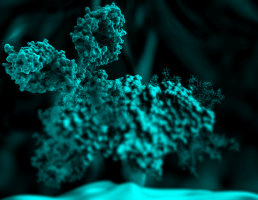
A clinical trial of an antibody-drug conjugate that combines the active portion of a chemotherapy drug with an antibody targeting a molecule expressed on tumour cells appears promising for the treatment of metastatic triple-negative breast cancer.
Results from a phase 2 clinical trial of sacituzumab govitecan - also called IMMU-132 - were published online in the Journal of Clinical Oncology.
"This approach may represent a new therapy paradigm for this difficult-to-treat disease, which is typically associated with an aggressive tumor biology and poor survival," says Aditya Bardia, MD, MPH, of the Massachusetts General Hospital (MGH) Cancer Center, lead and corresponding author of the JCO report.
Triple-negative breast cancers - tumours that do not have oestrogen or progesterone receptors and do not overexpress HER2 - are aggressive tumours, often affecting younger patients and African Americans.
Chemotherapy is the standard treatment option, but only produces a response in 15 to 20 percent of patients with metastatic disease.
Responses that are achieved seldom persist, and the average survival is 10 to 13 months.
Trop-2 is a molecule overexpressed in several tumours that have poor progress, including most triple-negative breast cancers, making it an attractive target for anti-cancer therapy.
Sacituzumab govitecan combines an antibody targeting Trop-2 with SN-38, the active metabolite of the chemotherapy drug irinotecan, the use of which is limited because of its significant gastrointestinal side effects.
Animal studies of this antibody-drug conjugate - which can deliver a larger dose of SN-38 directly to tumour cells with little effect on normal tissues - have shown high potency against implanted tumours, effects that were even stronger in combination with other breast cancer drugs, and a phase 1 clinical trial also had promising results.
The JCO paper reports on 69 patients with metastatic triple-negative breast cancer who enrolled in a larger trial testing sacituzumab govitecan in a number of Trop-2-expressing solid tumours.
All the patients in this study had been treated with at least one previous therapy and most had received several - the average was five - and had extensive metastatic disease.
The study protocol called for intravenous administration of the drug on day 1 and day 8 of repeated 21-day cycles.
Treatment continued as long as participants appeared to benefit and was halted if the tumour progressed, if there were significant side effects, or if the patient or treating physician chose to discontinue.
By the study cutoff in August 2016, 21 participants had achieved a response of a 30 percent or greater reduction in tumour size - two achieving complete remission - and nine of those continued treatment for at least 12 months.
Almost 70 percent of participants had some measurable tumour shrinkage.
The responses appeared less than two months after treatment began and lasted an average of almost nine months, with three lasting around 20 months.
Overall survival averaged 16.6 months.
Side effects such as nausea, hair loss and a drop in white blood cells were generally moderate and manageable with appropriate supportive therapy.
"We saw very encouraging responses that were early and durable in patients who had been heavily pre-treated with an average of five prior therapies since diagnosis. The major toxicities of this drug are manageable, which means it can be given repeatedly," says Bardia, who is an assistant professor of Medicine at Harvard Medical School. "It now needs to be studied in patients with early-stage disease, in combination with other drugs and to treat patients with other forms of breast cancer."
Source: Massachusetts General Hospital
We are an independent charity and are not backed by a large company or society. We raise every penny ourselves to improve the standards of cancer care through education. You can help us continue our work to address inequalities in cancer care by making a donation.
Any donation, however small, contributes directly towards the costs of creating and sharing free oncology education.
Together we can get better outcomes for patients by tackling global inequalities in access to the results of cancer research.
Thank you for your support.